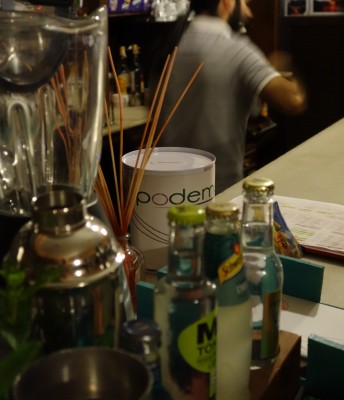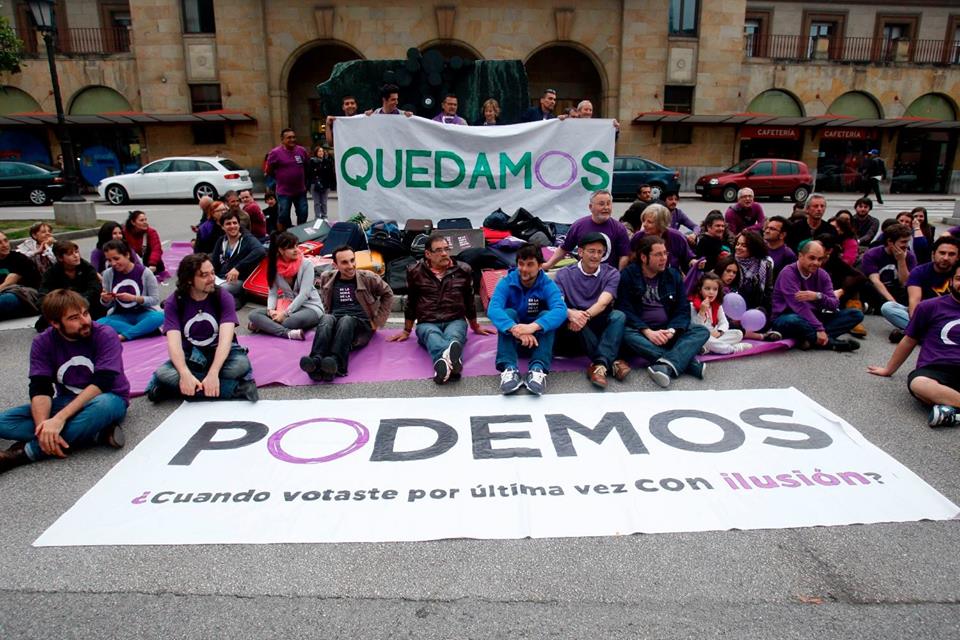In a cluster of houses in the Galician hills, close to the old Roman city of Lugo, Spain, little appears to have changed in the last 40 years. Chickens wander freely in the streets, while farmers discuss tractor machinery at length by the roadside. Yet in this sleepy corner of Spain’s north-western province, a new political initiative is taking shape.
Jago, a 48-year-old language teacher, is setting up a “circle”—a type of informal grassroots democratic and pluralistic assembly—in the hamlet that will act as the local face of the new political party Podemos. Meaning “we can” in Spanish, Podemos hopes to engage people who despair of conventional political approaches, and counter disillusionment with austerity measures by involving citizens in shaping policy from the bottom up.
Plenty of parties across Europe, watching their membership figures sink, share the same ambitions. But Podemos backs up the talk about “making politics more relevant to the public” with results. Since beginning in March with an entirely crowdfunded campaign and a manifesto created using suggestions from the public, the party claimed 8 percent of the national vote in the European Parliament elections. Many of its supporters are likely to have been people who hadn’t voted in years. A recent poll suggested that Podemos would take third place if a general election were held tomorrow, and could even challenge for second.
Circles: inclusive political spaces
One of the factors behind Podemos’s promising start is its community organising system of “circles.” This is what Jago is aiming for. Circles are groups with no leaders or membership fees, run through open public assemblies where attendees debate whatever they feel is most relevant to their situation. “Assemblies allow people who aren't involved in the movement to express their feelings and see that there are others that feel the same,” Oscar Gonzalez, a Podemos circle spokesperson in the Galician port city of Vigo, explains. Circles have a strong local focus, covering areas from entire cities to districts, or form around special interests (for example, there are currently circles for psychoanalysis, music and nursing).
The circles are growing fast. At the time of writing, there were more than 700 nationwide, an increase of almost 80 percent on the number recorded two months earlier. Attendance in assemblies has shot up: from an average of 20-30 people before the elections, Podemos Vigo claims that more than 300 turn up for each event. The idea of circles may work even in small cities, but things are different in rural Galicia. Hamlets like Jago's are rapidly emptying, with at least 1,400 in Galicia alone now completely deserted. There's little sign that they will regenerate on their own: the birth of a child is reported as a news item in the local paper, while the Galician regional government is spending 70 million euros (about 92 million US dollars) over the next three years in an attempt to improve the region's declining birth rates, which are the lowest in Spain.
All this hardly seems fertile ground for a young movement whose election slogan was: “When was the last time you voted with hope?” It's hard to imagine a thriving circle in the rural corners of this conservative part of Spain. Former dictator Francisco Franco was a Galician, while the centre-right Popular Party that rules at national level still registers some of its strongest results in the region. In the hamlet's only bar (which doubles as the butcher's and greengrocer's), Jago points out one of the regulars, a balding man in his 50s: “We get along fine, of course. But one day when I asked him for a light, I realised that he still had a cigarette lighter with a picture of Franco on it.”
Still, Jago remains undeterred. “I am a simple person, but I damn well know what discrimination and corruption is,” he says, citing his own difficulties in setting up a business and cataloguing a series of recent Galician graft cases. Like many Spaniards, Jago is struggling to pay his mortgage, having taken out a bank loan just before the crisis, a move he describes as his “single biggest mistake”.

Podemos collecting tin in a cafe in Vigo, Spain. Photo by author Tom Walker.
Still, he contributed five euros to Podemos's campaign fund for the European parliamentary elections. Considering that Podemos spent just over 12 euro cents for each of the 1.25 million votes it gained in May, his donation was in fact worth about 40 voters. While none of those 40 are likely to have come from Jago's hamlet, he remains on the lookout. “I believe that Podemos can be a haven for many others out there who never felt at home in another political party,” Jago says. “Little by little, I hope we can get somewhere.”
Podemos has already got somewhere in Navia, a district to the south-west of central Vigo. The party garnered 20 percent of the vote there, its best result in the city. Navia is made up of council houses that were built over the last eight years to house a young population of around 8,000. Podemos’ success there is all the more remarkable because, amid austerity, state money has actually been spent in Navia: the council has invested in road improvements, bus services, allotments and sports facilities, while the regional administration is building a health centre and a large garden area.
“It is true that governments have spent a lot of money on our neighbourhood, but the way they have done it—the amount they contracted for the works and modifications, and the absence of maintenance or planning—lead us to view these investments as tombstones planted in our environment,” explains Antonio Saá, from the online community Navia Merece.
Navia is also one of the districts where Podemos Vigo conducted a different kind of mailing campaign, hand-delivering a one-page message: “This letter did not reach you by post, because mailing a letter like this all over the country costs over 2 million Euros. Ask the parties who sent you an election letter by post where they got the money to do so and in exchange for what.” In Navia, where several prominent public projects remain unfinished and others have been beset by corruption allegations, arguments like these appear to have hit home.
A work in progress
Successes like these cannot hide the fact that Podemos is a work in progress, still adjusting to the surge of interest it has received in recent months. Local supporters openly acknowledge this. “It was far easier to run assemblies before the elections, when the groups were smaller and you could vote by raising hands. Now that's completely useless. You spend all your time counting and checking no-one is voting twice,” points out Manuel Villot, a member of the Vigo circle.
The circle has also recently had to introduce a moderator to keep discussions focused in assemblies, which had previously been relatively unstructured. Podemos is banking on technology as it attempts to retain its collaborative ethos while absorbing growing numbers, and is currently attempting to introduce Appgree and Loomio—online tools that allow people to submit ideas and vote on them—across the board.
The party built much of its profile through television, particularly the talk-show appearances of the academic and party figurehead Pablo Iglesias, but the Internet now seems to be playing the most important role at the local level. Many circles don't have websites and rely on Facebook to communicate with existing supporters and attract new members. “Podemos would be unthinkable without Facebook and Twitter,” explains Mayka Arias, the coordinator of Podemos Vigo's page. Aware that this technical focus might put some people off the party, Podemos Vigo is running free computer courses to explain the new tools and recruiting Internet cafes to provide free access for people who can't get online.
The coming months will be key for Podemos, with a new organisational structure for the party set to be announced in autumn. “I believe it will keep growing—there's no ceiling at the moment,” suggests Saá. “Now we'll have to see if Podemos can make choices that are truly different rather than just more of the same.”









13 comments
Bravo,
This is very exciting.
One disturbing question, though. The article says that the size of “circles” has increased to as much as 500, making procedures unwieldy. Why haven’t circles been divided into smaller, more decentralized groups? Does it mean that established local leaders do not expect the possible smaller groups to be “reliable” without their leadership? Is this a reflexion of the distrust of spontaneous initiatives? Just asking. My experience is that ruling cliques can spring up very quickly.
I should leave this question for others who are more closely involved. My general impression, though, is that circles _are_ dividing into smaller, more decentralised groups – one of the most active parts of the Vigo circle was the part involved in starting new, more local circles.
Thanks Tom,
I’m very glad to hear that.